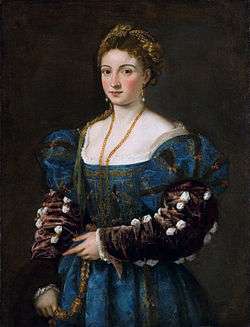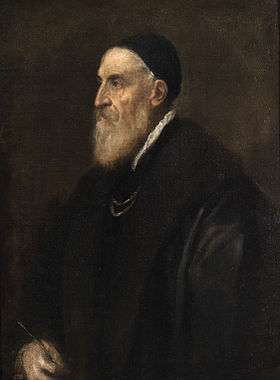La Bella
 | |
| Artist | Titian |
|---|---|
| Year | c. 1536 |
| Medium | oil on canvas |
| Dimensions | 100 cm × 75 cm (39 in × 30 in) |
| Location | Palazzo Pitti, Florence |
La Bella is a portrait of an unknown woman by Titian, painted around 1536 and now in the Palazzo Pitti in Florence. The work of a mature artist, it shows the woman with Renaissance ideal proportions and a natural expressive force. The composition is clear.[1]
La Bella is often discussed as alternative to Titian's Portrait of Isabella d'Este in Vienna, because the order was a cajoling rejuvenated portrait by the more than 60 years old art patron. Eye colour, hair colour, eye brows and sex appeal would even homogenize all portraits of Isabella d'Este.[2]
Titian likely used the same model for the Venus of Urbino.[3] Both pictures are documented in letters[4] by Francesco Maria I della Rovere, Duke of Urbino, who was the husband of Isabella's daughter Eleonora Gonzaga. The Venus of Urbino was painted for the marriage of their son,[5] so there are similarities and the environment of the same family.
Symbol language: La Bella points with her hand to a zibellino, which is associated with the Venetian mature noble ladies and again, Isabella d'Este was one of the first ladies to wear.[6]
References
- ↑ (Spanish) Los maestros de la pintura occidental, Taschen, 2005, page 176, ISBN 3-8228-4744-5
- ↑ Leandro Ozzola, Isabella d'Este e Tiziano, in Bollettino d'arte, 1931, p. 491-494 Download: http://www.bollettinodarte.beniculturali.it/opencms/multimedia/BollettinoArteIt/documents/1407155929929_06_-_Ozzola_491.pdf
- ↑ Corrado Cagli: L'opera completa di Tiziano, Rizzoli Milano 1969, no. 177 - La Bella
- ↑ Ciatti, Marco/ Navarro, Fausta/ Riitano, Patrizia: Titian's La Bella - Woman in a Blue Dress.Edifir Firenze 2011, pp. 41-48, ISBN 978-88-7970-523-3 (Original letters in Italian and English)
- ↑ Goffen, Rona: Sex, Space and History in Titian's Venus of Urbino, in Titian's Venus of Urbino, ed. by Goffen, Rona, Cambridge 1997, pp. 63-90
- ↑ (German) Malaguzzi, Silvia: Schmuck und Juwelen in der Kunst. Parthas Verlag Berlin 2008, p. 274, ISBN 978-3-936324-94-5
